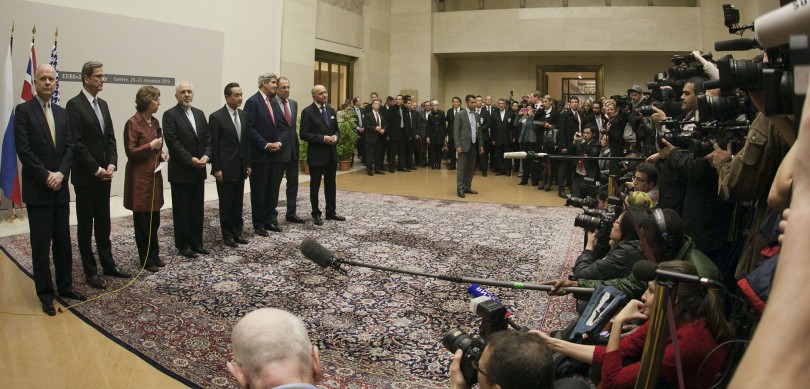aNewDomain — Far be it for me to bend my knee to President Obama — neither the office of president nor the man currently occupying said office get much respect from this news junkie — but the Republicans have crossed the line about Iran.
Over much of the past year, the Obama Administration has been conducting negotiations with Iran over its nuclear energy program. By most accounts, talks have been fruitful, moving closer to the goal of a deal under which Iran would guarantee not to build nuclear weapons in exchange for at least a partial lifting of U.S.-led trade and other economic sanctions, some of which date nearly four decades to the Islamic revolution, the seizure of the U.S. embassy in Tehran and the 444-day hostage crisis.
Under an interim agreement signed a year ago to jumpstart talks, Iran has frozen its nuclear program and the U.S. has not imposed new sanctions.
Because both countries have been more open to a deal than ever before, negotiations have gone well, so well that — in light of the White House’s recent announcement that it plans to normalize relations with Cuba — many Iranians hope that Iran too may resume diplomatic relations with the United States.
Americans and Iranians would both benefit from a thaw. There would be new economic opportunities, not least due to Iran’s geography, which makes it the shortest route for a pipeline for Caspian Sea oil and gas pipelines. Iran’s sponsorship of Hezbollah and cozier ties to Hamas, not to mention its influence in post-occupation Iraq and as a Shiite counterbalance to the Saudi Wahhabism that fuels much of radical Islamism, would make it a valuable Middle East partner. Forty percent of the world’s oil passes through the Strait of Hormuz on the Persian Gulf — which is controlled by Iran.
First and foremost, however, in the American system diplomatic relations are and always have been the domain of the executive branch. It is a radical breach of the separation of powers, and rude and disrespectful to the office of the president, for legislators to undermine White House efforts to forge closer ties with another nation, which is exactly what the GOP is currently doing.
Members of Congress are pushing hard for new sanctions against Iran, or at least the threat of additional sanctions should the U.S. and Iran fail to come to terms soon. Pressing the issue further, House Speaker John Boehner (R-OH) took the extraordinary step of inviting right-wing Israeli prime minister Benjamin “Bibi” Netanyahu to address a joint session of Congress — without consulting with the president. “Inviting a foreign leader to speak at the Capitol without even informing the president, let alone consulting him, is a bald-faced usurpation for which there is no recent precedent,” notes Washington Post columnist Eugene Robinson.
To put it mildly, Netanyahu is cra-cra when it comes to Iran. He repeatedly compares Iran to Nazi Germany (never mind the whole Iran has never invaded another country or built a death camp thing), warning that it’s 1938 (the year before Hitler started World War II) and that the world must act militarily or risk losing everything. Worried that a speech will likely bash Iran and thus lead to the scuttling of talks, House Minority Leader Nancy Pelosi (D-CA) has asked Netanyahu to stay home.
As someone who has been on the receiving end of accusations impugning my loyalty to my nation of birth, I am always hesitant to accuse other Americans of being unpatriotic. In this case, with so much at stake and so much to be gained, however, I can’t avoid the conclusion that Congressional Republicans are engaging in diplomatic sabotage so extreme as to be anti-American, bordering on treason.
For aNewDomain, I’m Ted Rall.













